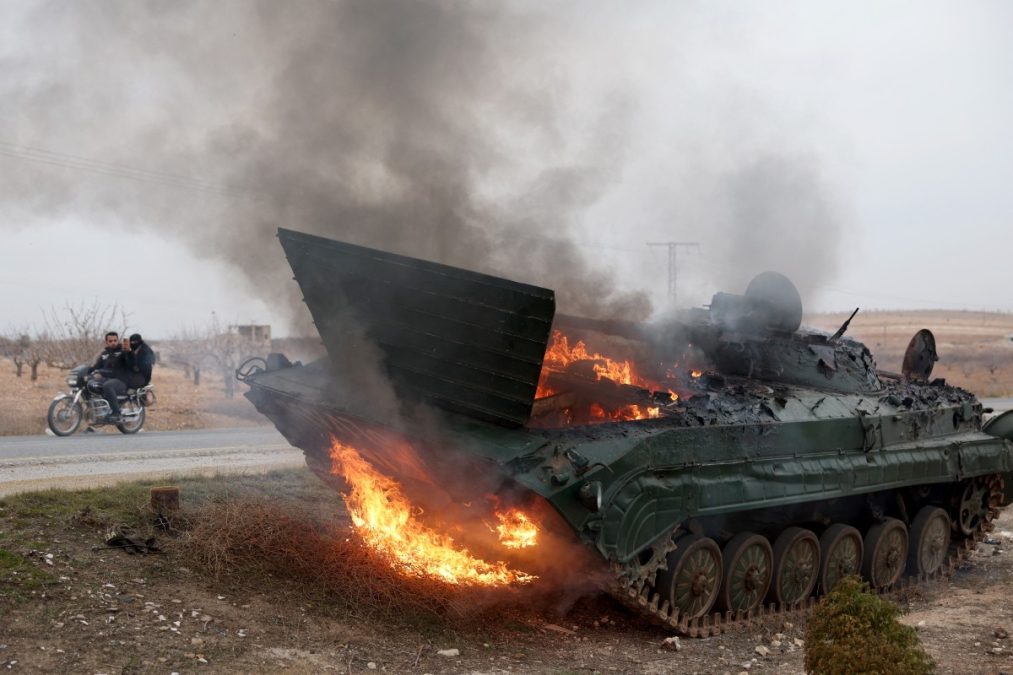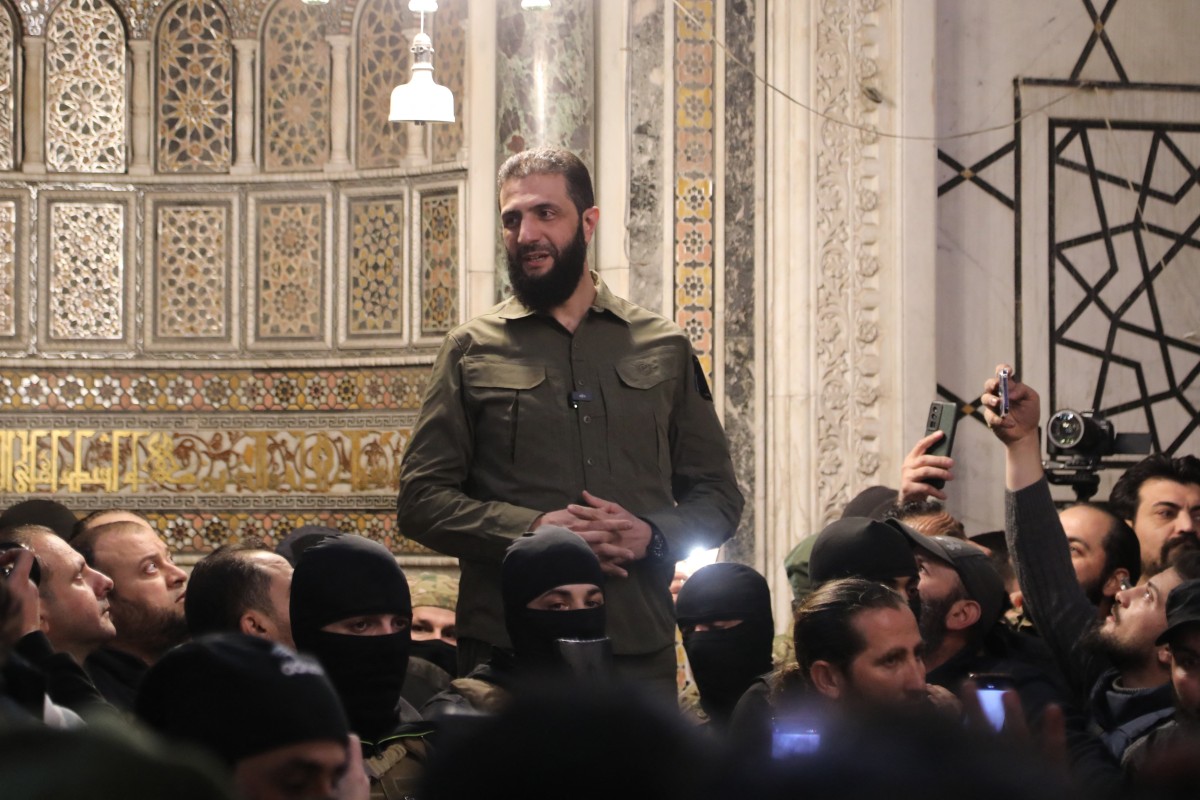Damascus, Syria — Celebrations erupted around Syria and crowds ransacked President Bashar al-Assad’s luxurious home on Sunday after rebels swept into Damascus and declared he had fled the country, in a spectacular end to five decades of Baath party rule.
Assad’s whereabouts were not clear, but his key backer Russia said he had resigned from the presidency and left Syria.
Residents in the capital were seen cheering in the streets as the rebel factions heralded the departure of “tyrant” Assad, saying: “We declare the city of Damascus free.”
AFPTV footage showed a column of smoke rising from central Damascus, and AFP correspondents in the city saw dozens of men, women and children wandering through Assad’s home after it had been looted.
The rooms of the residence had been left completely empty, save some furniture and a portrait of Assad discarded on the floor, while an entrance hall at the presidential palace not far away had been torched.
“I can’t believe I’m living this moment,” tearful Damascus resident Amer Batha told AFP by phone.
“We’ve been waiting a long time for this day,” he said, adding: “We are starting a new history for Syria.”
Assad’s reported departure comes less than two weeks after the Islamist Hayat Tahrir al-Sham (HTS) group challenged more than five decades of Assad family rule with a lightning offensive.
“After 50 years of oppression under Baath rule, and 13 years of crimes and tyranny and displacement… we announce today the end of this dark period and the start of a new era for Syria,” the rebel factions said on Telegram.
While there has been no communication from Assad or his entourage on his whereabouts, Prime Minister Mohammed al-Jalali said he was ready to cooperate with “any leadership chosen by the Syrian people”.
The head of war monitor the Syrian Observatory for Human Rights, Rami Abdel Rahman, told AFP: “Assad left Syria via Damascus international airport before the army security forces left” the facility.
AFP has been unable to independently verify some of the information provided by the different parties, including the reported departure.
Prisoners set free –
Around the country, people toppled statues of Hafez al-Assad, Bashar al-Assad’s father and the founder of the system of government that he inherited.
For the past 50 years in Syria, even the slightest suspicion of dissent could land one in prison or get one killed.
As rebels entered the capital, HTS said its fighters broke into a jail on the outskirts of Damascus, announcing an “end of the era of tyranny in the prison of Sednaya”, which has become a by-word for the darkest abuses of Assad’s era.
UN war crimes investigators on Sunday described Assad’s fall as a “historic new beginning” for Syrians, urging those taking charge to ensure the “atrocities” committed under his rule are not repeated.
The rapid developments came just hours after HTS said it had captured the strategic city of Homs, where prisoners were also released.
Homs was the third major city seized by the rebels, who began their advance on November 27.
US President Joe Biden was keeping a close eye on the “extraordinary events” unfolding in Syria, the White House said.
US president-elect Donald Trump said that Assad had “fled his country” after losing Russia’s backing.
‘Syria is ours’ –
Rebel factions aired a statement on Syrian state television, urging fighters and citizens to safeguard the “property of the free Syrian state”.
State TV broadcast a message proclaiming the “victory of the great Syrian revolution”.
The Islamist leader of HTS, Abu Mohammed al-Jolani, visited Damascus’s landmark Umayyad Mosque, as crowds greeted him with smiles and embraces, AFP images showed.
HTS is rooted in the Syrian branch of Al-Qaeda.
Proscribed as a terrorist organization by Western governments, HTS has sought to soften its image in recent years.
Before Sunday’s announcements, residents had described to AFP a state of panic in Damascus, but morning saw chants and cheering, with celebratory gunfire and shouts of “Syria is ours and not the Assad family’s”.
On Sunday afternoon the rebels announced a curfew in the capital until 5:00 am (0200 GMT) Monday.
The commander of Syria’s US-backed, Kurdish-led Syrian Democratic Forces (SDF), which controls much of northeast Syria, hailed as “historic” the fall of Assad’s “authoritarian regime”.
‘We’re going home’ –
The Observatory on Sunday said Israel struck Syrian army weapons depots Sunday on the outskirts of Damascus.
Assad’s rule had for years been supported by the Lebanese group Hezbollah, whose forces “vacated their positions around Damascus”, a source close to the group said Sunday.
The UN envoy for Syria said the country was at “a watershed moment”, while Turkey, which has historically backed the opposition, called for a “smooth transition”.
Iran, a key backer of Assad throughout the civil war, said it expected “friendly” ties with Syria to continue, even as its embassy in Damascus was vandalized.
Since the start of the rebel offensive, at least 826 people, mostly combatants but also including 111 civilians, have been killed, the Observatory said.
Syria’s war killed more than 500,000 people, and forced half of the population to flee their homes.
“I can barely remember Syria,” said Reda al-Khedr, who was only five years old when he and his mother escaped Syria’s Homs in 2014.
“But now we’re going to go home to a liberated Syria,” he told AFP in Cairo.

In Jaramana, which is home to mostly Druze, Christians and families displaced by more than a decade of civil war, video footage verified by AFP showed young men chanting: “Syria is ours, it doesn’t belong to the Assad family.”
One witness said by phone that he saw “dozens of protesters” tear down the statue of Assad’s father in a main square in Jaramana that bears the former president’s name.
Another witness who passed through the square later said the statue had been smashed.
Damascus resident Mohammed, 35, told AFP he felt “a mix of shock, fear and worry about the future”.
“Nothing compares to what we’re going through today. But I think we’re witnessing days that will go down in history,” he added.
Israeli forces impose curfew
Israel’s military imposed a curfew for residents of five Syrian towns in a demilitarized buffer zone of the Golan Heights which Prime Minister Benjamin Netanyahu ordered troops to seize.
“For your security you must stay at home and not go out until further notice,” Lieutenant Colonel Avichay Adraee, an Israeli army spokesman, said on X, after Netanyahu’s order earlier Sunday for the military to seize the zone, which abuts the Israeli-occupied Golan Heights, after the fall of Syria’s president.








